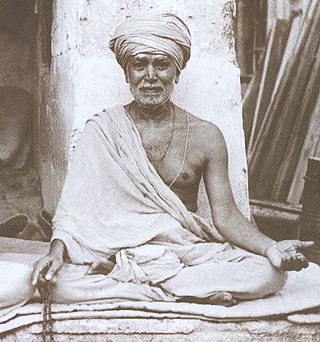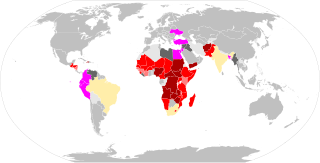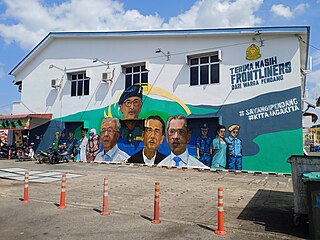Prostitution in Kenya is widespread. The legal situation is complex. Although prostitution is not criminalised by National law, municipal by-laws may prohibit it.. It is illegal to profit from the prostitution of others, and to aid, abet, compel or incite prostitution.. UNAIDS estimate there to be 133,675 prostitutes in the country.
There is a high crime rate in all regions of Kenya. Petty offences are the most common crime with stealing being the most reported crime. Robbery and theft are among the least cited criminal offences. Crime in Kenya is as low as in countries like Tunisia with a rating of 3.46 crimes per 100,000 people. However, it is important to note that crime in Kenya often goes unreported and police often lack the training or experience to effectively respond to crimes. Despite the reportedly somewhat low crime rate, Kenya has a big problem with organized crime and many gangs work with corrupt police officers and sometimes even the government. Kenya has a criminality score of 7.02 on the Organized Crime Index, the 16th most in the world, an improvement from 11th in 2021.

Self Help Africa is an international charity that promotes and implements long-term rural development projects in Africa. Self Help Africa merged with Gorta in July 2014, and in 2021 merged with UK-based INGO, United Purpose. The organisation also owns a number of social enterprise subsidiaries - Cumo Microfinance, TruTrade and Partner Africa.

Occurring between July 2011 and mid-2012, a severe drought affected the entire East African region. Said to be "the worst in 60 years", the drought caused a severe food crisis across Somalia, Djibouti, Ethiopia and Kenya that threatened the livelihood of 9.5 million people. Many refugees from southern Somalia fled to neighboring Kenya and Ethiopia, where crowded, unsanitary conditions together with severe malnutrition led to a large number of deaths. Other countries in East Africa, including Sudan, South Sudan and parts of Uganda, were also affected by a food crisis.

James Mwangi CBS is a Kenyan accountant, career banker, businessman, and entrepreneur. He is the current Group Managing Director and Group Chief Executive Officer of Equity Group Holdings Plc, the banking conglomerate with one of the largest customer bases on the African continent, over 14 million as of December 2019.

BAPS Charities is an international, religious, charitable organization that originates from the Bochasanwasi Akshar Purushottam Swaminarayan Sanstha (BAPS) with a focus on serving society. This focus on service to society is stated in the organization's vision, that "every individual deserves the right to a peaceful, dignified, and healthy way of life. And by improving the quality of life of the individual, we are bettering families, communities, our world, and our future." BAPS Charities carries out this vision through a range of programs addressing health, education, the environment, and natural disaster recovery. The organization's worldwide activities are funded through donations and are led by a community of over 55,000 volunteers who are mostly members of BAPS. The volunteers work with local communities and other charities and the organization's activities are mainly based out of their mandirs.

Kenyan–Dutch relations are bilateral relations between Kenya and the Netherlands.
The Mombasa–Nairobi Standard Gauge Railway is a standard-gauge railway (SGR) in Kenya that connects the large Indian Ocean city of Mombasa with Nairobi, the country's capital and largest city. This SGR runs parallel to the narrow-gauge Uganda Railway that was completed in 1901 under British colonial rule. The East African Railway Master Plan provides for the Mombasa–Nairobi SGR to link with other SGRs being built in the East African Community.
The House of Dawda Group is a privately owned conglomerate in Uganda.

The COVID-19 pandemic in Mongolia was a part of the ongoing worldwide pandemic of coronavirus disease 2019 caused by severe acute respiratory syndrome coronavirus 2. The COVID-19 pandemic was confirmed to have reached Mongolia when its first case was confirmed in a French man who traveled from Moscow to Dornogovi on 10 March 2020.
The COVID-19 pandemic in Kenya was a part of the worldwide pandemic of coronavirus disease 2019 caused by severe acute respiratory syndrome coronavirus 2. The virus was confirmed to have reached Kenya on 12 March 2020, with the initial cases reported in the capital city Nairobi and in the coastal area Mombasa.

Between June 2019 and February 2022, a major outbreak of desert locusts began developing, threatening food supplies in East Africa, the Arabian Peninsula and the Indian subcontinent. The outbreak was the worst to hit Kenya in 70 years, and the worst in 25 years for Ethiopia, Somalia, and India.

The COVID-19 pandemic has greatly impacted the international and domestic economies. Thus, many organizations, private individuals, religious institutions and governments have created different charitable drives, concerts and other events to lessen the economic impact felt.

During the COVID-19 pandemic, food insecurity has intensified in many places – in the second quarter of 2020 there were multiple warnings of famine later in the year. In an early report, the Nongovernmental Organization (NGO) Oxfam-International talks about "economic devastation" while the lead-author of the UNU-WIDER report compared COVID-19 to a "poverty tsunami". Others talk about "complete destitution", "unprecedented crisis", "natural disaster", "threat of catastrophic global famine". The decision of WHO on March 11, 2020 to qualify COVID as a pandemic, that is "an epidemic occurring worldwide, or over a very wide area, crossing international boundaries and usually affecting a large number of people" also contributed to building this global-scale disaster narrative.
Editar Adhiambo Ochieng is a Kenyan activist and feminist who advocates for women's rights and supports survivors of sexual violence. In 2020, Ochieng became the first winner of the Wangari Maathai Award in Kenya for her contribution to curb the spread of COVID-19 pandemic in the Kibera slum.

Sustainable Development Goal 2 aims to achieve "zero hunger". It is one of the 17 Sustainable Development Goals established by the United Nations in 2015. The official wording is: "End hunger, achieve food security and improved nutrition and promote sustainable agriculture". SDG 2 highlights the "complex inter-linkages between food security, nutrition, rural transformation and sustainable agriculture". According to the United Nations, there are around 690 million people who are hungry, which accounts for slightly less than 10 percent of the world population. One in every nine people goes to bed hungry each night, including 20 million people currently at risk of famine in South Sudan, Somalia, Yemen and Nigeria.

Due to its severity, the COVID-19 pandemic has caused countries to send aid, as part of the international responses and management regarding the pandemic. Types of materials aided includes masks, medical supplies, personal protective equipment, money, and test kits. It started with aid to China as the virus spreads primarily there, and then internationally as it spreads globally. The destination of the aid ranges from hospitals, COVID-19 healthcare workers, research on the vaccine, to societies vulnerable. People donating includes the government of said country, notable people, organizations and institutions, charities, as well as regular people.

The United Nations response to the COVID-19 pandemic has been led by its Secretary-General and can be divided into formal resolutions at the General Assembly and at the Security Council (UNSC), and operations via its specialized agencies and chiefly the World Health Organization in the initial stages, but involving more humanitarian-oriented agencies as the humanitarian impact became clearer, and then economic organizations, like the United Nations Conference on Trade and Development, the International Labour Organization, and the World Bank, as the socioeconomic implications worsened.

The Government of Malaysia along with various non governmental organisations (NGOs), companies, and foreign governments introduced various financial aid and relief programs in response to the economic impacts of the COVID-19 pandemic in Malaysia. In 27 March 2020, Prime Minister Muhyiddin Yassin introduced an economic stimulus package known as the Prihatin worth RM250 billion.

Jonathan Jackson Foundation (JJF), founded in the year 2019, is a Nairobi-based non-governmental organization that aims to provide sustainable livelihoods for youth and women in informal settlements in Kenya. JJF's transformative agenda is to provide the target group with a fishing rod and teach them how to become self-sustainable. The foundation's pillars include economic empowerment, sports (Basketball & football), and Humanitarian aid through the Jenga Jirani initiative.












